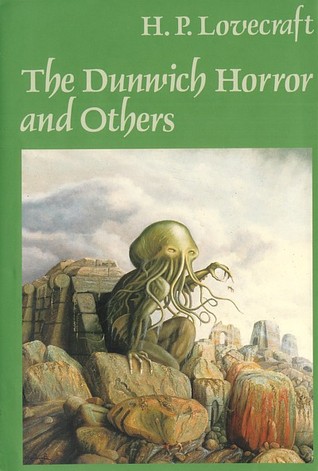The Lord of the Rings (1955) by J.R.R. Tolkien vs The Lord of the Rings films (2001-2003) - The book is one of my favorite of all time... and the movies are pretty darn good. While watching the movies you can really tell that Peter Jackson also loves the books. Verdict: Read the book and watch the films
Atlas Shrugged (1957) by Ayn Rand vs Atlas Shrugged: Part 1 (2001 film)- To say I disliked the book is an understatement. I was ready to hate the movie but I really couldn't. I have to say Taylor Shilling gives a pretty good performance and the problem with the book really isn't the first third. Still I wouldn't recommend the movie either. Verdict: Avoid both.
David Copperfield (1850) by Charles Dickens vs David Copperfield (1999 BBC mini-series) - The book has a ton of stuff in it and it would be pretty difficult to make a completely faithful adaptation. The BBC mini-series is pretty good and since Daniel Radcliffe plays young David it made me see the possible influence this book had on the Harry Potter series. Verdict : If you have the time read the book, but the mini series is good too.
Inherent Vice (2009) by Thomas Pynchon vs. Inherent Vice (2014 film) - For such a weird book, the film version does a great job of being very faithful to the novel. I enjoyed both so... Verdict: Read the book and see the movie.
The Exorcist (1971) by William Peter Blatty vs. The Exorcist (1973 film) - I enjoyed both versions of this. The movie is a classic and the book adds some depth to the secondary characters. Verdict : Both are great.
Perfume (1985) by Patrick Süskind vs. Perfume: The Story of a Murderer (2006 film) - The movie was pretty good and faithful to the book but the novel is just so creepy and gives more depth to the characters. Verdict : Read the book.
Jurassic Park (1990) by Michael Crichton vs Jurassic Park (1993 film) - The book has some problems: shallow characters, unnecessary subplots, too much emphasis on computer interfaces, etc. The film fixes most of these. Verdict : See the movie.
The Hellbound Heart (1986) by Clive Barker vs. Hellraiser (1987 film) - I enjoyed both and they are pretty similar but... Verdict: See the movie (if you like really weird scary movies).
Wednesday, December 31, 2014
Thursday, December 25, 2014
Mystery Book # 22 The Thirty-Nine Steps by John Buchan
 Lucinda and I are slowly watching every Alfred Hitchcock film in chronological order. One of his earlier films is based on The Thirty-Nine Steps, so I figured I'd read it before watching the movie. And I have to say that I don't see how this book ranked so high on this list... The plot is fairly simple. They guy, Richard Hannay, finds out about an international conspiracy and is then chased all over the English countryside by unknown people while he figures out what to do. Buchan's style is very plain and basically one thing after another happens to this guy and he just narrowly escapes everything. The main character isn't well developed and he just goes from situation to situation. The book is short but a lot of stuff happens so I felt like none of the scenes really had a chance to build up the suspense that could have been there. I'll give this one a B.
Lucinda and I are slowly watching every Alfred Hitchcock film in chronological order. One of his earlier films is based on The Thirty-Nine Steps, so I figured I'd read it before watching the movie. And I have to say that I don't see how this book ranked so high on this list... The plot is fairly simple. They guy, Richard Hannay, finds out about an international conspiracy and is then chased all over the English countryside by unknown people while he figures out what to do. Buchan's style is very plain and basically one thing after another happens to this guy and he just narrowly escapes everything. The main character isn't well developed and he just goes from situation to situation. The book is short but a lot of stuff happens so I felt like none of the scenes really had a chance to build up the suspense that could have been there. I'll give this one a B.
Thursday, December 18, 2014
Colorless Tsukuru Tazaki and His Years of Pilgramage by Haruki Murakami
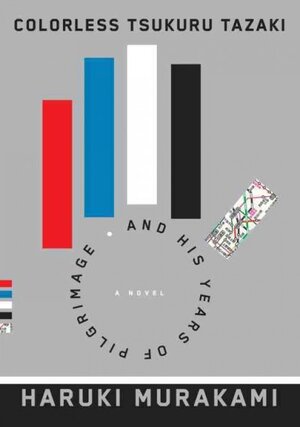 My wife knows that I'm a fan of Haruki Murakami and for my birthday she gave me his newest book Colorless Tsukuru Tazaki and His Years of Pilgramage. It isn't on any of my lists so I'll keep this short... The book is about a 36 year old guy who is a bit of a loner. The reason for this is that twenty years earlier his four closest friends all decided to suddenly cut off all contact from him. I enjoyed the book because it has the usual stuff you find in a Murakami book.... weird dreams, side stories with no point, people disappearing, questions of identity, random stuff just happening, etc... though this one doesn't have any cats... and of course a whole bunch of unresolved plot points. It isn't as good as The Wind Up Bird Chronicle but better than 1Q84... I'll give it an A-.
My wife knows that I'm a fan of Haruki Murakami and for my birthday she gave me his newest book Colorless Tsukuru Tazaki and His Years of Pilgramage. It isn't on any of my lists so I'll keep this short... The book is about a 36 year old guy who is a bit of a loner. The reason for this is that twenty years earlier his four closest friends all decided to suddenly cut off all contact from him. I enjoyed the book because it has the usual stuff you find in a Murakami book.... weird dreams, side stories with no point, people disappearing, questions of identity, random stuff just happening, etc... though this one doesn't have any cats... and of course a whole bunch of unresolved plot points. It isn't as good as The Wind Up Bird Chronicle but better than 1Q84... I'll give it an A-.Thursday, December 11, 2014
Book # 7 - The Return of the King (The Lord of the Rings Book 3 of 3) by J.R.R. Tolkien
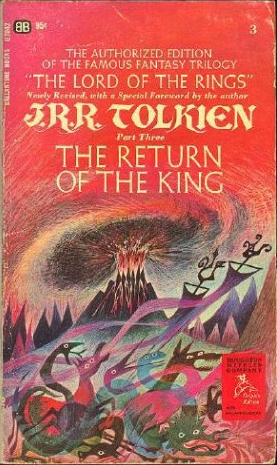 One of the more interesting things about The Return of the King, at least to me, is the 100+ pages of appendices at the end of it. It isn't that the information in there is riveting... I'm just fascinated that it even exists and that Tolkein felt compelled to include it all. In a way it just shows how devoted he was to developing the entire world of Middle Earth to the tiniest detail. But really... it is just so much an overload of information that it is kind of comical. Though in a way reading the whole thing is essential to getting the whole Lord of the Rings experience. First off it includes the story of Aragorn's and Arwen's relationship which is arguably very important to the story and is barely mentioned in the main text. It also includes more details on the backstories of the dwarves of The Hobbit and some of Gandalf's motivations for helping the dwarves get rid of Smaug. It also includes a summary of over six thousand years of Middle Earth history and complete family histories of major hobbits, the kings and stewards of Gondor and the kings of Rohan. After that it includes super detailed descriptions of several languages of Middle Earth and exhaustive details of how to pronounce Elvish words.
One of the more interesting things about The Return of the King, at least to me, is the 100+ pages of appendices at the end of it. It isn't that the information in there is riveting... I'm just fascinated that it even exists and that Tolkein felt compelled to include it all. In a way it just shows how devoted he was to developing the entire world of Middle Earth to the tiniest detail. But really... it is just so much an overload of information that it is kind of comical. Though in a way reading the whole thing is essential to getting the whole Lord of the Rings experience. First off it includes the story of Aragorn's and Arwen's relationship which is arguably very important to the story and is barely mentioned in the main text. It also includes more details on the backstories of the dwarves of The Hobbit and some of Gandalf's motivations for helping the dwarves get rid of Smaug. It also includes a summary of over six thousand years of Middle Earth history and complete family histories of major hobbits, the kings and stewards of Gondor and the kings of Rohan. After that it includes super detailed descriptions of several languages of Middle Earth and exhaustive details of how to pronounce Elvish words.I'm not sure if it is despite or because of the ridculous appendices, I've got to give it an A+. As a whole, The Lord of the Rings is one of my favorite books.
Thursday, December 4, 2014
Horror Book # 26 - Night Shift by Stephen King
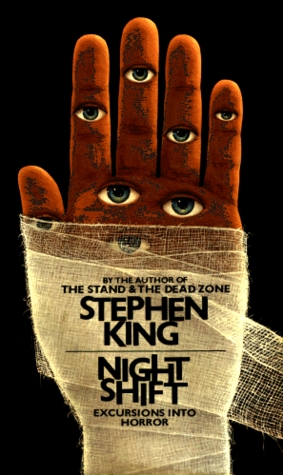 Despite having read several Stephen King books I had somehow never read any of his short story collections. Night Shift is his first collection of stories and for the most part the stories are all scary and pretty varied. The book starts out strong with Jerusalem's Lot which is a Lovecraftian story about a cult of vampires. After that the rest of the first half of the book is good but not great. Three of the stories are about inanimate objects coming to life (there are killer trucks, killer army figures and a killer dry cleaning machine). The second half is much stronger though since most of the stories don't have supernatural elements. This includes The Ledge about a man forced out on a building's ledge; Quitters, Inc. about a company with a novel way to get people to quit smoking; and Children of the Corn about weird kids in corn fields. Overall the collection was scary and probably caused a few nightmares. The short story format suits King well since it doesn't all him to go on and on like he sometimes does. I'll give it an A-.
Despite having read several Stephen King books I had somehow never read any of his short story collections. Night Shift is his first collection of stories and for the most part the stories are all scary and pretty varied. The book starts out strong with Jerusalem's Lot which is a Lovecraftian story about a cult of vampires. After that the rest of the first half of the book is good but not great. Three of the stories are about inanimate objects coming to life (there are killer trucks, killer army figures and a killer dry cleaning machine). The second half is much stronger though since most of the stories don't have supernatural elements. This includes The Ledge about a man forced out on a building's ledge; Quitters, Inc. about a company with a novel way to get people to quit smoking; and Children of the Corn about weird kids in corn fields. Overall the collection was scary and probably caused a few nightmares. The short story format suits King well since it doesn't all him to go on and on like he sometimes does. I'll give it an A-. Thursday, November 27, 2014
Inherent Vice by Thomas Pynchon
 Now for a book not on any list... Inherent Vice by Thomas Pynchon. When this book came out a few years ago I wanted to read it and added it to my long mental list of books that I'd want to someday read. When I saw that Paul Thomas Anderson (one of my favorite directors) was directing a movie adaptation, I knew that I'd have to actually read it before the movie came out. Now that I think about it I should have probably read another Pynchon novel beforehand so that I could have a better sense of the author (he has two books on the 101-200 best of list).
Now for a book not on any list... Inherent Vice by Thomas Pynchon. When this book came out a few years ago I wanted to read it and added it to my long mental list of books that I'd want to someday read. When I saw that Paul Thomas Anderson (one of my favorite directors) was directing a movie adaptation, I knew that I'd have to actually read it before the movie came out. Now that I think about it I should have probably read another Pynchon novel beforehand so that I could have a better sense of the author (he has two books on the 101-200 best of list). The plot of Inherent Vice is pretty complicated and isn't really the point of the book. The main character is Doc Sportello, a private detective that is asked by an old girlfriend to check up on her current boyfriend because she thinks her boyfriend's wife and the wife's boyfriend are planning on killing him or something. And then of course the guy disappears and a possible conspiracy unfolds. But thinking about it now, in the end I'm not even sure if it is clear whether or not there was a conspiracy or not. I'd say the book is a lot like The Big Sleep filtered through Fear and Loathing in Las Vegas.
On a side note... I've noticed in quite a few books set in Los Angeles that authors like to detail the routes their characters take through the city. This book is no exception (it even mentions a very specific shortcut between La Cienega and La Brea that I've recently discovered). Once again I'm reminded of the SNL sketch "The Californians".
I enjoyed the book and Doc's misadventure is entertaining (especially once I realized that the plot specifics weren't really that important). Now I'm looking forward to the film version. I'll give the book an A-.
Thursday, November 20, 2014
Book # 7 - The Two Towers (The Lord of the Rings Book 2 of 3) by J.R.R. Tolkien
 Since I loved The Fellowship of the Ring, it goes without saying that I also greatly enjoyed The Two Towers. The book is split into two halves. In the first half we follow the quest of Aragorn, Gimli and Legolas as they try to rescue Merry and Pippen and eventually meet up with the riders of Rohan, defend Helm's Deep and go to Saruman's tower. In the second half we follow Frodo and Sam (and Gollum) as they continue onwards to Mordor, meet Faramir and encounter the giant spider Shelob. This book just gets better every time I read it... so many details to always pick up. A+
Since I loved The Fellowship of the Ring, it goes without saying that I also greatly enjoyed The Two Towers. The book is split into two halves. In the first half we follow the quest of Aragorn, Gimli and Legolas as they try to rescue Merry and Pippen and eventually meet up with the riders of Rohan, defend Helm's Deep and go to Saruman's tower. In the second half we follow Frodo and Sam (and Gollum) as they continue onwards to Mordor, meet Faramir and encounter the giant spider Shelob. This book just gets better every time I read it... so many details to always pick up. A+Thursday, November 13, 2014
Horror Book # 12 & Sci-Fi Book # 31- Strange Case of Dr Jekyll and Mr Hyde by Robert Louis Stevenson
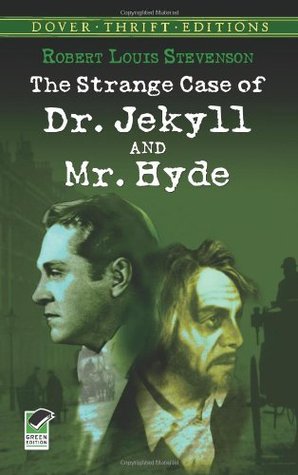 The Strange Case of Dr. Jekyll and Mr. Hyde was another book I read (actually reread) while I was on vacation last month. The story involves a lawyer that meets an ugly strange and rude man named Mr. Hyde that is somehow involved with the life of one of his good friends Dr. Jekyll. The lawyer becomes curious and tries to figure out how the two people are connected. And as everyone already knows it turns out that Dr. Jekyll and Mr. Hyde are actually the same person. In an effort to separate the good and evil parts of his self, Dr. Jekyll creates a potion that transforms him between the two... but unfortunately his body becomes accustomed to the potion and he ends up staying Mr. Hyde longer and longer and is unable to return to his normal self.
The Strange Case of Dr. Jekyll and Mr. Hyde was another book I read (actually reread) while I was on vacation last month. The story involves a lawyer that meets an ugly strange and rude man named Mr. Hyde that is somehow involved with the life of one of his good friends Dr. Jekyll. The lawyer becomes curious and tries to figure out how the two people are connected. And as everyone already knows it turns out that Dr. Jekyll and Mr. Hyde are actually the same person. In an effort to separate the good and evil parts of his self, Dr. Jekyll creates a potion that transforms him between the two... but unfortunately his body becomes accustomed to the potion and he ends up staying Mr. Hyde longer and longer and is unable to return to his normal self.The story is entertaining and I'd imagine the big reveal was more shocking when the book was first published. I found it interesting that Dr. Jekyll thought his intentions were actually good and that he at first didn't feel like he was responsible for Hyde's actions. However the more Jekyll allowed his dark side to come out the more he began to enjoy it and seemed to become addicted to it. Something to think about. I'll give this one an A, it is a classic.
Thursday, November 6, 2014
Horror Book # 11 - The Exorcist by William Peter Blatty
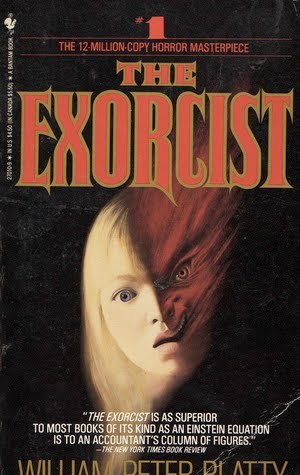 While on vacation I needed to find a book to read on the way back and saw a cheap copy of The Exorcist by William Peter Blatty for sale. Since Halloween was coming up I figured now would be a good time to read it. The story is well known... The daughter of a movie star gets possessed by a demon and then there is an exorcism.
While on vacation I needed to find a book to read on the way back and saw a cheap copy of The Exorcist by William Peter Blatty for sale. Since Halloween was coming up I figured now would be a good time to read it. The story is well known... The daughter of a movie star gets possessed by a demon and then there is an exorcism. With a book that has such a well known movie it is hard not to continually compare it to the film. The film is faithful to the book but really minimized the roles of all of the supporting characters... so much so that they are hard to remember in hindsight. In the book the roles of the Regan's nanny, the police detective and Father Dyer are all expanded and give the whole story more depth. Now that I think about it, most of those characters are pretty pointless in the movie.
I enjoyed the book. There weren't really any surprises since it the film stuck pretty closely to it, but I liked getting an expanded version of the story with a bit more depth. And of course it was scary. I'll give it an A.
Thursday, October 30, 2014
Sci-Fi Book # 19 & Horror Book # 68 - The Invisible Man by H.G. Wells
 Unlike Invisible Man by Ralph Ellison, The Invisible Man by H.G. Wells tells the story of a man who is literally invisible. One day a small inn takes in a man completely covered in bandages. At first everyone assumes that the man has had some kind of accident. After some unusual crimes people become suspicious and the invisible man's secret gets out.
Unlike Invisible Man by Ralph Ellison, The Invisible Man by H.G. Wells tells the story of a man who is literally invisible. One day a small inn takes in a man completely covered in bandages. At first everyone assumes that the man has had some kind of accident. After some unusual crimes people become suspicious and the invisible man's secret gets out. Much like Wells' War of the Worlds, The Invisible Man shows normal people encountering something that seems unbelievable and the result is panic. I enjoy Wells' style and can imagine how groundbreaking his work was when it was published. This one gets an A.
Thursday, October 23, 2014
Book # 7 - The Fellowship of the Ring (The Lord of the Rings Book 1 of 3) by J.R.R. Tolkien
 The Lord of the Rings is a book that most people are already familiar with... so there isn't a need to recap the story. There's Frodo and the ring, Gandalf the Wizard, Gollum, Aragorn... etc.
The Lord of the Rings is a book that most people are already familiar with... so there isn't a need to recap the story. There's Frodo and the ring, Gandalf the Wizard, Gollum, Aragorn... etc.This will be the third time that I've read this book and after reading The Fellowship of the Ring it the most enjoyable time so far. There is just so much information throughout the book that Tolkien just casually throws out there that it can be hard to take it all in on a first (or second reading). Seeing the films multiple times also helps. This is a book meant to be read several times... and it is well worth it. There will always be new details to be picked up.
Did I mention that this is one of my favorite books of all time? The first book gets an A+.
Thursday, October 16, 2014
Mystery Book # 36 - Strong Poison by Dorothy L. Sayers
 While reading Strong Poison I knew that it was part of a series of books... what I just now realized is that FIVE of those books are on my mystery reading list. The series follows Lord Peter Wimsey, a British gentleman that solves mysteries in his spare time. In this book he is following the case of Harriet Vane, a woman accused of poisoning her ex-boyfriend. He believes that she is innocent and sets out to solve the case before Harriet is convicted... and he also falls in love with her.
While reading Strong Poison I knew that it was part of a series of books... what I just now realized is that FIVE of those books are on my mystery reading list. The series follows Lord Peter Wimsey, a British gentleman that solves mysteries in his spare time. In this book he is following the case of Harriet Vane, a woman accused of poisoning her ex-boyfriend. He believes that she is innocent and sets out to solve the case before Harriet is convicted... and he also falls in love with her.The book was entertaining. Maybe I'd have liked it more if I didn't start with a book from the middle of the series. It reminded me of one of those Masterpiece Mysteries that Lucinda is always watching. It is definitely very British. I'm glad I enjoyed it since there are four more books on this list. I'll give it a B+.
Thursday, October 9, 2014
Book # 48 Remembrance of Things Past (Part 4 of 7)- Cities of the Plain by Marcel Proust
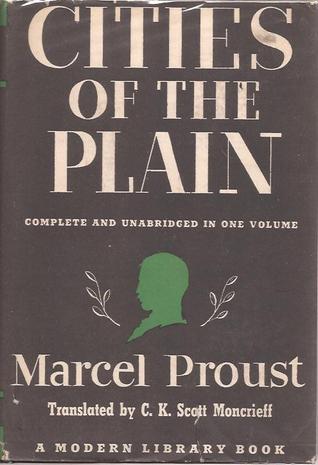 Volume one of Remembrance of Things Past was great. Volume two was entertaining and moving. Volume three started to get on my nerves but was still worth reading. Volume four was tough... and took me a year to slowly get through. All I can say is that it is incredibly boring.
Volume one of Remembrance of Things Past was great. Volume two was entertaining and moving. Volume three started to get on my nerves but was still worth reading. Volume four was tough... and took me a year to slowly get through. All I can say is that it is incredibly boring.In Cities of the Plain the Narrator has become a part of French high society and attends a lot of parties. And he details all of the people me meets and their snobbish behaviors in great great detail for hundreds of pages. Probably three quarters of the book is just his descriptions of some gathering of people gossiping about other people (and it isn't a short book either). As for the other quarter of the book, I actually enjoyed it when the Narrator talked about his evolving feelings about his friend Albertine and his thoughts on random stuff in life.
It is kind of hard to give this one a grade. Some parts are incredibly well written and beautiful... but most of it is snobby French people talking about other snobby French people. I guess a B-. It makes me think that anyone that lists Remembrance of Things Past as the greatest book ever written is a bit pretentious. Also, the book mentions Don Quixote and Anna Karenina
Thursday, October 2, 2014
Book # 104 - Perfume by Patrick Suskind
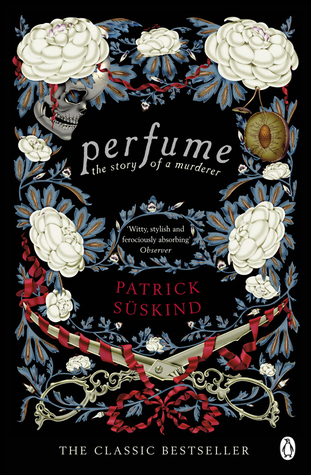 According to Wikipedia, Perfume inspired songs by both Nirvana and Rammstein. I also saw where someone compared it to a mix of Victor Hugo and Anne Rice. I'd say that seems accurate since it reminded me of both Les Miserables and Interview with the Vampire at times.
According to Wikipedia, Perfume inspired songs by both Nirvana and Rammstein. I also saw where someone compared it to a mix of Victor Hugo and Anne Rice. I'd say that seems accurate since it reminded me of both Les Miserables and Interview with the Vampire at times.Perfume tells the story of Jean-Baptiste Grenouille, an 18th Century French orphan that is born with an acute sense of smell but no personal scent. Of course the life of an 18th century orphan isn't easy and Grenouille is a pretty strange guy... so the story gets a bit weird. One day while walking around Paris he smells a young woman and becomes obsessed with her odor... so much so that he kills her and just keeps sniffing her body. From there he decides to learn how to be a perfume maker so that he can replicate her scent. This leads to a lot more deaths and perfume making.
I didn't know what to expect from this book... but I really loved it. It is just so unusual and the story takes a few unexpected turns along the way. The book has a fun pulpy feel to it and is full of interesting characters. Plus Suskind goes overboard on describing the different scents of things throughout the book... which only adds to its strangeness. I give it an A and recommend it to any of my friends that listen to Nirvana or Rammstein.
Thursday, September 25, 2014
Book # 80 - Native Son by Richard Wright - Banned Books Week Edition part 2

It is a bit surprising to see that most of the books on our list have been challenged at one time or another. Another book that has great literary merit and historical significance but is frequently challenged is Native Son by Richard Wright... usually for "violence, sex, and profanity."
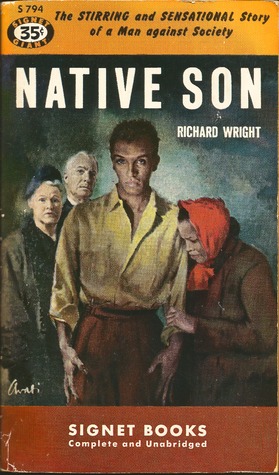 Native Son tells the story of Bigger Thomas, a young black man living in 1940's Chicago and struggling to figure out how to get by in life. His mom forces him to take a job as a chauffeur for a rich white family and then there is a huge plot twist that I somehow didn't see coming. Sometimes I don't like to know too much about something before I read it and in this case it paid off... anyhow I wouldn't want to say what happens next because it would be a huge spoiler. Let's just say that Bigger gets in trouble and most of the book is him trying to figure out what to do.
Native Son tells the story of Bigger Thomas, a young black man living in 1940's Chicago and struggling to figure out how to get by in life. His mom forces him to take a job as a chauffeur for a rich white family and then there is a huge plot twist that I somehow didn't see coming. Sometimes I don't like to know too much about something before I read it and in this case it paid off... anyhow I wouldn't want to say what happens next because it would be a huge spoiler. Let's just say that Bigger gets in trouble and most of the book is him trying to figure out what to do.What is unusual is that Bigger is not in any way a likable character. I think it would be fair to say that most readers would be rooting against him. The point of the book seems to me that you shouldn't feel sympathetic towards Bigger, but that people need to realize that the social conditions of poverty and racism will create people like Bigger...the long term solution for a better society isn't to continually lock up people like Bigger but to fix our society so that everyone gets a chance and someone like Bigger never gets created. At least that's what I think Wright is trying to get across... I could see a pretty good discussion in an AP English class in which some kids would disagree with Wright's viewpoint.
At the time he wrote it, Richard Wright was a communist and Native Son definitely reflects that. Besides just showing racism, the book also shows how communists were discriminated against and targeted by police. Near the end of the book Bigger's lawyer gives a long speech that gets kind of preachy about how American society is partly responsible for Bigger's crimes and indirectly argues against capitalism. Whether or not you agree, I still think it is interesting to take in someone's viewpoint (as long as it isn't as long winded and heavy handed as Atlas Shrugged). Surprisingly none of the challenges on the book are for promoting communism.
I enjoyed the book... partly because I kept being shocked at how the main character kept getting more and more unlikable. It also has a strong political viewpoint and gave me something to think about and debate in my head. I'll have to give it an A.
Sunday, September 21, 2014
Book # 73 - The Color Purple by Alice Walker - Banned Books Week Edition
 As someone with a degree in Library Science I feel somewhat obligated to mention that it Banned Books Week. Every year the American Library Association compiles a list of books that were "challenged" by people wanting them removed from public or school libraries. Yes, there are still people out there that get enraged enough by a book that they make a written complaint to a librarian asking for the book to be removed. Of course librarians as a whole are against censorship but I think they also find it somewhat humorous that they receive these complaints... how is it that The Chocolate War is still getting complaints? This probably explains why they get so excited for Banned Book Week and put out huge posters and displays of books that were challenged.... be a rebel and read The Catcher in the Rye!
As someone with a degree in Library Science I feel somewhat obligated to mention that it Banned Books Week. Every year the American Library Association compiles a list of books that were "challenged" by people wanting them removed from public or school libraries. Yes, there are still people out there that get enraged enough by a book that they make a written complaint to a librarian asking for the book to be removed. Of course librarians as a whole are against censorship but I think they also find it somewhat humorous that they receive these complaints... how is it that The Chocolate War is still getting complaints? This probably explains why they get so excited for Banned Book Week and put out huge posters and displays of books that were challenged.... be a rebel and read The Catcher in the Rye!One of those books that often gets challenged is The Color Purple by Alice Walker. The Color Purple is a book that I wouldn't have ever thought to read if it wasn't on our list. So this is one of the times where reading something from the list really pays off... this book is great (but a bit depressing for the most part).
The novel is made up mostly of letters written by the main character, Celie, that detail her life. And her life is full of difficulties... First her father sexually abuses her and sells her children, then she gets married off to a man that physically abuses her and pretty much treats her like a slave. Her husband then allows his mistress, Shug, to move in with them! However Celie and Shug become great friends and Celie eventually builds up the strength to stand up for herself, leave her husband and start her own business. She also finds out that her sister has been writing to her for years and she discovers what happened to her children.
From the very beginning the story is captivating and I felt bad for Celie's struggles. Near the end it looks like the book could go with either a totally sad ending or an uplifting ending... and I'm glad it ended the way it did. As a whole it was entertaining and very thought provoking. I'll give it an A.
For a listing of challenges to The Color Purple you can check out http://www.ala.org/bbooks/frequentlychallengedbooks/classics/reasons which lists the challenges several classic books have received in the past. Even though it does have great literary merit, I can see some why some parents might complain if the book was given as assigned reading, but trying to completely remove it from a library is just ridiculous.
Thursday, September 18, 2014
Sci-Fi Book # 20 and Horror Book # 51 Jurassic Park by Michael Crichton
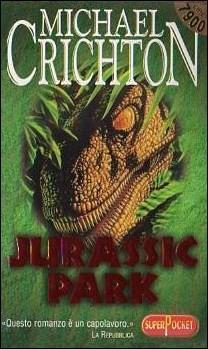 Back in 8th-10th grade I read quite a few Michael Crichton books... Sphere, Congo, Rising Sun, and of course Jurassic Park. I remember really liking Jurassic Park when I read it as a kid and how excited I was for the movie to come out. Re-reading it now I have a different opinion.
Back in 8th-10th grade I read quite a few Michael Crichton books... Sphere, Congo, Rising Sun, and of course Jurassic Park. I remember really liking Jurassic Park when I read it as a kid and how excited I was for the movie to come out. Re-reading it now I have a different opinion.First off, most all of the characters are one dimensional... especially Alan Grant and Ellie Sattler. Their only characteristic is that they know stuff about dinosaurs. Next, the character of Alexis is super annoying, she literally complains the entire book. Also, way too much time is spent with characters trying to figure out how the computer system at Jurassic Park is supposed to work... who cares??? Why not spend that time telling us about dinosaurs chasing people and not use page after page showing us computer interfaces. Plus there is a whole sub-plot about dinosaurs getting off the island on a boat that is pointless since there is a prologue that tells you dinosaurs are already getting off the island. Thankfully all of these things were fixed in the film version.
Still... I enjoyed the book but I wouldn't classify it as great. The book has a good idea and has some pretty exciting scenes. I'd give the book a B.
Thursday, September 11, 2014
Sci-Fi Book # 4 Second Foundation (Foundation Trilogy Book 3 of 3) by Isaac Asimov
 My thoughts on the third book in The Foundation Trilogy, Second Foundation, are pretty much the same as the previous book - I enjoyed the book and still found the whole idea of psychohistory fascinating but it didn't quite blow me away for a book so highly ranked and considered one of the best of all time.
My thoughts on the third book in The Foundation Trilogy, Second Foundation, are pretty much the same as the previous book - I enjoyed the book and still found the whole idea of psychohistory fascinating but it didn't quite blow me away for a book so highly ranked and considered one of the best of all time. This volume deals with two different attempts to discover the location and secret of the "second foundation" founded hundreds of years ago by Hari Seldon. In the first half The Mule from the previous book continues his search for the second foundation so that he can conquer it and be the ruler of everything. The second half deals with the search by the first foundation some time after the reign of The Mule ends.
The weird names Asimov uses still annoys me, and keeping track of the characters takes some work.
This one also gets a B+.
Book # 50 Harry Potter (Book 5 of 7) - Harry Potter and the Order of the Phoenix by J.K. Rowling
 I can't believe it has been over a year since I read the previous Harry Potter book... how time flies.
I can't believe it has been over a year since I read the previous Harry Potter book... how time flies. This time Harry has to live with the magic "media" spreading untrue and distorted stories about him while having to deal with new teacher Professor Umbridge who quickly uses her political power to take over Hogwarts and run it like a fascist state.
Harry Potter and the Order of the Phoenix is easily my favorite Harry Potter book. Unlike the previous books, Harry is often unlikeable and moody and in the end he totally falls for Voldemort's trap because he didn't listen to the advice people gave him throughout the book. Also Professor Umbridge is a great villain and I'd argue even more interesting than Voldemort. Unlike evil dark wizards, fascist teachers do exist. The reader is never really sure of her motivations either... Is she in on Voldemort's plot? Does she really think that he's dead? Does she just have blind allegiance to the Ministry of Magic's viewpoint? In this book at least it isn't clear what is going on in her head.
This one gets an A+.
Thursday, September 4, 2014
The Magician's Land by Lev Grossman
 I couldn't wait for this book to arrive... unfortunately the post office messed up and didn't deliver it for a few days for some unknown reason (they kept saying it was undeliverable because no one was home despite me being at home at all times) and when they did deliver it the mailman literally threw the package at my house. Anyway....
I couldn't wait for this book to arrive... unfortunately the post office messed up and didn't deliver it for a few days for some unknown reason (they kept saying it was undeliverable because no one was home despite me being at home at all times) and when they did deliver it the mailman literally threw the package at my house. Anyway....The Magician's Land is the final book in the Magicians Trilogy and does a very good job wrapping up all of the loose story lines and brings back pretty much every character from the previous books. Quentin is now almost thirty and is finally getting adjusted to knowing that he'll never visit Fillory again and has become a teacher at his old school. While over in Fillory, Elliot and Janet find out that Fillory is falling apart and is about to "end". Quentin and one of his students become part of a plot to steal a mysterious briefcase and eventually wind up involved in the mission to save Fillory.
I enjoyed the final book as much as the first two... it left me wanting more books in the series even though everything is wrapped up so nicely in the end. I'll give it an A-.
Also, the book starts with a quote from The Last Battle of the Narnia series and mentions Alice in Wonderland and Winnie-the-Pooh. And like the previous two books it has a cover that doesn't really make sense.
Thursday, August 28, 2014
Sci-Fi book # 31 Snow Crash by Neal Stephenson
 I didn't know much about Snow Crash going into it, but I had been looking forward to reading it ever since I bought a cheap used copy at The Last Book Store last year. The story is about Hiro, a computer hacker that also delivers pizzas for the Mafia. It starts out pretty promisingly... the virtual reality Hiro helped create may be threatened by a new virus that can harm both computers and humans and have significant real world consequences. And there are some interesting ideas throughout about how language works, how religions spread and the relationship between man and machine...but somehow it all became a bit too jumbled by the end. The links between plot points were sometimes unclear and all of the information about the Tower of Babel and Sumeria didn't seem to grow organically out of the story and ended up being just a lot of exposition to try and explain what was going on. And the ending seemed pretty abrupt too. Still parts of it were enjoyable and the world Stephenson creates has a lot of character. I'll give it a B.
I didn't know much about Snow Crash going into it, but I had been looking forward to reading it ever since I bought a cheap used copy at The Last Book Store last year. The story is about Hiro, a computer hacker that also delivers pizzas for the Mafia. It starts out pretty promisingly... the virtual reality Hiro helped create may be threatened by a new virus that can harm both computers and humans and have significant real world consequences. And there are some interesting ideas throughout about how language works, how religions spread and the relationship between man and machine...but somehow it all became a bit too jumbled by the end. The links between plot points were sometimes unclear and all of the information about the Tower of Babel and Sumeria didn't seem to grow organically out of the story and ended up being just a lot of exposition to try and explain what was going on. And the ending seemed pretty abrupt too. Still parts of it were enjoyable and the world Stephenson creates has a lot of character. I'll give it a B.
Thursday, August 21, 2014
Sci-Fi Book # 4 Foundation and Empire (Foundation Trilogy Book 2 of 3) by Isaac Asimov
 Wow, somehow I went eight months without reading anything from my science fiction list... I'll probably read a few in a row. Also I've decided to change which science fiction book list I'll be using. The new list is at http://www.ranker.com/crowdranked-list/the-greatest-science-fiction-novels-of-all-time. The top 25 or so on each list is pretty similar, but after that this new lists tends towards more Jules Verne and Kurt Vonnegut and less Orson Scott Card. So...
Wow, somehow I went eight months without reading anything from my science fiction list... I'll probably read a few in a row. Also I've decided to change which science fiction book list I'll be using. The new list is at http://www.ranker.com/crowdranked-list/the-greatest-science-fiction-novels-of-all-time. The top 25 or so on each list is pretty similar, but after that this new lists tends towards more Jules Verne and Kurt Vonnegut and less Orson Scott Card. So...Foundation and Empire picks up some time after the first Foundation book. The book is broken into two halves. In the first half the Foundation is still growing and faces the threat of an attack by the empire that is starting to feel threatened by it. The second half tells the story of a "mutant" called the Mule that threatens to disrupt Hari Seldon's long range plans for the Foundation. Since he is a mutant that doesn't interact with humans in a normal way, the Mule throws off the time line and is able to take over the Foundation while they are confused.
I enjoyed the book but the weird names Asimov gives his characters still throws me off a bit. As a stand alone book it doesn't really tell much of a story though, I'll have to see how the next book follows up on the Mule's story. I'll give it a B+.
Thursday, August 14, 2014
Book # 8 One Hundred Years of Solitude by Gabriel Garcia Marquez
 Well this book was different from anything I've read before. One Hundred Years of Solitude is about the Buendia family and their town of Macondo. Chronologically it starts with Jose Arcadio Buendia and his wife Ursula as they leave their hometown with a few other families and found a new village. From there the book follows the family for the next six generations! And these characters have pretty interesting lives so there is a ton of plot. I'd say there is more plot in the first twenty pages than in any volume of Remembrance of Things Past. There really is enough story here for thousands of pages but it is all crammed into 450 pages.
Well this book was different from anything I've read before. One Hundred Years of Solitude is about the Buendia family and their town of Macondo. Chronologically it starts with Jose Arcadio Buendia and his wife Ursula as they leave their hometown with a few other families and found a new village. From there the book follows the family for the next six generations! And these characters have pretty interesting lives so there is a ton of plot. I'd say there is more plot in the first twenty pages than in any volume of Remembrance of Things Past. There really is enough story here for thousands of pages but it is all crammed into 450 pages.The main theme of the story seems to be that each generation tends to make the same mistakes as the previous generation and thus prevent themselves from being happy. Each generation is pretty similar to the generations before it, they even use the same names over and over. There are five characters named Aureliano and Jose. The story also has some fantasy elements to it that no one in the story thinks is weird (one characters literally ascends to heaven and another is always followed by butterflies, and a couple live to about 150 years old).
Overall I enjoyed the book, mostly because it was different from anything else. However, I could have done with a bit less story... with so many events and characters it took some effort to remember how everyone was connected to one another. Also the ending was pretty satisfying. I'll give it an A.
Thursday, August 7, 2014
Book # 52 David Copperfield by Charles Dickens
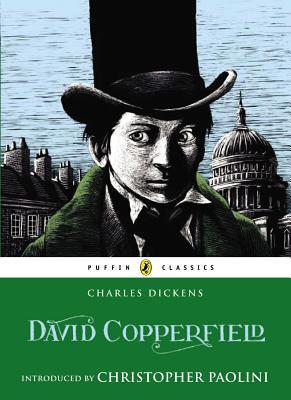 When I told Lucinda that I was thinking about reading David Copperfield next she said something about how long it would take me to get through it. I replied that I thought I could read it in a week. Lucinda doubted that... Challenge accepted! And with an hour to spare I got through to the very end.
When I told Lucinda that I was thinking about reading David Copperfield next she said something about how long it would take me to get through it. I replied that I thought I could read it in a week. Lucinda doubted that... Challenge accepted! And with an hour to spare I got through to the very end. David Copperfield tells the story of the title character from birth up until about mid-life. Basically to sum up a 1200 page book, David has a mean step-father that sends him away to boarding school, then his mom dies, then his step-father sends him to go work in his factory (as a young boy still), he runs away to his aunt that takes him, he meets a bunch of people as he goes to school and starts a career, he falls in love a few times, he meets more people and becomes involved in their lives, gets married (twice) and has children. The end.
The whole book if filled with the interesting characters that David meets. There is the slimey Uriah Heep, the poor Peggotty family, the always broke Micawber, the innocent Dora, his crazy aunt Betsey Trotwood, the untrustworthy friend Steerforth, and so on. At one point David mentions that he read Don Quixote and Tom Jones. I liked how the book is so funny even when David is living through horrible conditions and that he always tries to make the best of a situation. I'll have to give it an A+.
Wednesday, August 6, 2014
Book # 78 The Stand by Stephen King
Progress Book #30 of 100
This was a big book and the first Stephen King novel I have completed. I already knew the story before reading because we watched the miniseries. This is a case where the novel is way better than the film version. The story follows the few survivors of the world after a virus is released from a military lab and most of the population die. The few that survive dream that they need to travel and meet an old lady and have nightmares of an evil presence. It is a battle of good vs. evil and there are a few characters that that you aren't sure which category they fit into. Despite being a big novel, it was a straight forward read it moved along at a good pace. I think watching the miniseries was helpful too, since it establish who was who. If I had just read the book I think it would have taken longer to figure out each character and their role. That is the one major complaint that I have with the book. There were characters that I really liked and wanted to see what happened to them next, but the novel would move on to a different story line for a good amount of pages before it got back to who you wanted to read about. So I guess there is a patience factor that was hard for me to deal with.
Overall it was an interesting story. I'm not sure if I'll ready other novels by Stephen King, but am happy that one of his most popular ones is on our list and that I was able to read it.
I'll give the book a 90%, A-
This was a big book and the first Stephen King novel I have completed. I already knew the story before reading because we watched the miniseries. This is a case where the novel is way better than the film version. The story follows the few survivors of the world after a virus is released from a military lab and most of the population die. The few that survive dream that they need to travel and meet an old lady and have nightmares of an evil presence. It is a battle of good vs. evil and there are a few characters that that you aren't sure which category they fit into. Despite being a big novel, it was a straight forward read it moved along at a good pace. I think watching the miniseries was helpful too, since it establish who was who. If I had just read the book I think it would have taken longer to figure out each character and their role. That is the one major complaint that I have with the book. There were characters that I really liked and wanted to see what happened to them next, but the novel would move on to a different story line for a good amount of pages before it got back to who you wanted to read about. So I guess there is a patience factor that was hard for me to deal with.
Overall it was an interesting story. I'm not sure if I'll ready other novels by Stephen King, but am happy that one of his most popular ones is on our list and that I was able to read it.
I'll give the book a 90%, A-
Monday, August 4, 2014
Book # 70 Les Miserables by Victor Hugo
Progress Book # 29 of 100
I was really exited to read this book because I have really good memories of reading it in high school with my friends Julie and Mindi for English. I think we read the abridged version and I remember Julie bringing over a DVD (maybe VHS) copy of a Broadway play that we watched. For years I wanted to go see the play and then Daniel finally took me when it was in LA at the Ahmanson a few years ago. The movie also came out right before I re-read this so the story was fresh in my mind. That being said I don't know if I hyped it up too much, because the book seemed way longer this time around. The story was still good, but the sections where Hugo goes into French history, or even at the beginning and the pages of the priest's family tree that go on and on and are never mentioned again started to get old around 700 pages. I'm sure it was the difference of reading the abridged version before. I don't think abridged is so bad, we aren't doing it for this list, but I would recommend the condensed version to anyone.
The story follows Jean Valjean and his life from leaving prison after 19 for stealing bread to becoming a successful businessman and mayor, and then hiding out in a convent and caring for his adopted daughter Cosette. It is touching story and I would recommend the abridged version to anyone.
I'll give the book 97%, A
I was really exited to read this book because I have really good memories of reading it in high school with my friends Julie and Mindi for English. I think we read the abridged version and I remember Julie bringing over a DVD (maybe VHS) copy of a Broadway play that we watched. For years I wanted to go see the play and then Daniel finally took me when it was in LA at the Ahmanson a few years ago. The movie also came out right before I re-read this so the story was fresh in my mind. That being said I don't know if I hyped it up too much, because the book seemed way longer this time around. The story was still good, but the sections where Hugo goes into French history, or even at the beginning and the pages of the priest's family tree that go on and on and are never mentioned again started to get old around 700 pages. I'm sure it was the difference of reading the abridged version before. I don't think abridged is so bad, we aren't doing it for this list, but I would recommend the condensed version to anyone.
The story follows Jean Valjean and his life from leaving prison after 19 for stealing bread to becoming a successful businessman and mayor, and then hiding out in a convent and caring for his adopted daughter Cosette. It is touching story and I would recommend the abridged version to anyone.
I'll give the book 97%, A
Thursday, July 31, 2014
The Magician King by Lev Grossman
 The Magician King picks up a couple of years after The Magicians with Quentin enjoying his time as king in the magical land of Fillory. At first he isn't really sure if he should try and find an adventure to go on because it could endanger his very cushy job as king of a magic realm. So Quentin finds what he thinks will be a very easy adventure that he undertakes pretty much out of boredom. However the quest goes awry when it suddenly lands him stuck back on Earth. So begins his quest to return to Fillory. At fist his quest doesn't seem all that important to anyone other than Quentin, but we slowly learn that this is the quest he is really meant to undertake in order to save magic for the multiverse. Also,a good portion of the book reveals the back-story of his high school friend Julia. Unlike Quentin, Julia just missed out on admission to Brakebills (the magic university) and her life slowly falls apart as she learns that magic is real and that she is excluded from that world. Slowly she finds other magicians living on the fringes and teaches herself a different form of magic.
The Magician King picks up a couple of years after The Magicians with Quentin enjoying his time as king in the magical land of Fillory. At first he isn't really sure if he should try and find an adventure to go on because it could endanger his very cushy job as king of a magic realm. So Quentin finds what he thinks will be a very easy adventure that he undertakes pretty much out of boredom. However the quest goes awry when it suddenly lands him stuck back on Earth. So begins his quest to return to Fillory. At fist his quest doesn't seem all that important to anyone other than Quentin, but we slowly learn that this is the quest he is really meant to undertake in order to save magic for the multiverse. Also,a good portion of the book reveals the back-story of his high school friend Julia. Unlike Quentin, Julia just missed out on admission to Brakebills (the magic university) and her life slowly falls apart as she learns that magic is real and that she is excluded from that world. Slowly she finds other magicians living on the fringes and teaches herself a different form of magic. I enjoyed this sequel just as much as the first book. At first it seems like Quentin's quest isn't really all that important but by the end as all the threads come together it all makes sense and shows us the bigger picture. Julia's story also expands the scope that magic exists on Earth and shows a different type of magic education that is drastically different from Quentin's in the first book. So like the first book, this one gets an A-. I can't wait for the final book in the series to come out soon.
This book also mentions Harry Potter, The Lord of the Rings, Alice in Wonderland, Frankenstein, Rebecca, The Wind in the Willows, and Watership Down.
Wednesday, July 30, 2014
Book #17 Pride and Prejudice by Jane Austen
Progress Book # 28 of 100
I may be a little biased (I have one whole bookshelf- 5 shelves of books filled with P&P variations, sequels and alternate endings), but Pride and Prejudice is the best book ever! When I saw that this book was on the list I was tempted to read it first, but thought I should wait a little while until I go though a few of the other novels. Daniel and I celebrated our first wedding anniversary at Disney World and I decided to take this book as my vacation read. I don't know how many times I've read the novel, but it's truly an enjoyment each time.
Here are some of my favorite lines which start in the first sentence:
"It is a truth universally acknowledged, that a single man in possession of a good fortune, must be in want of a wife."
When Elizabeth and Caroline Bingely are walking around the room Mr. Darcy says:
"You either choose this method of passing the evening because you are in each other's confidence and have secret affairs to discuss, or because you are conscious that your figures appear to the greatest advantage in walking- if the first, I should be completely in your way- and if the second, I can admire you much better as I sit by the fire."
“A lady's imagination is very rapid; it jumps from admiration to love, from love to matrimony in a moment.”
Lady Catherine comments on Elizabeth's piano performances, despite not playing herself:
"There are few people in England, I suppose, who have more true enjoyment of music that myself, or a better natural taste. If I had ever learnt, I should have been a great proficient....to come to Rosings every day, and play on the pianoforte in Mr. Jenkinson's room. She would be in nobody's way, you know in that part of the house."
The novel takes place in Regency England, when women didn't inherit the land from the men in the family. Mr. and Mrs. Bennet have five daughters and this weighs heavily on Mrs. Bennet. She is obsessed with getting them married off to anyone she can including the officers in Meryton, their cousin Mr. Collin's, and the rich Mr. Bingley. After all as she says to Jane her eldest daughter "I was sure you could not be so beautiful for nothing!"
The novel is Elizabeth Bennet's story. Lizzie's first encounter with Mr. Darcy is the worst "First Impression" two people can have. She judges him on that first meeting, rightly so since he was so mean, and then spends most of the novel mis-understanding him and his actions. Of course things work out in the end, and that not a spoiler because if you are reading this then you know me and I've probably made you watch at least one P&P movie.
I give this book A+ 100%
I may be a little biased (I have one whole bookshelf- 5 shelves of books filled with P&P variations, sequels and alternate endings), but Pride and Prejudice is the best book ever! When I saw that this book was on the list I was tempted to read it first, but thought I should wait a little while until I go though a few of the other novels. Daniel and I celebrated our first wedding anniversary at Disney World and I decided to take this book as my vacation read. I don't know how many times I've read the novel, but it's truly an enjoyment each time.
Here are some of my favorite lines which start in the first sentence:
"It is a truth universally acknowledged, that a single man in possession of a good fortune, must be in want of a wife."
When Elizabeth and Caroline Bingely are walking around the room Mr. Darcy says:
"You either choose this method of passing the evening because you are in each other's confidence and have secret affairs to discuss, or because you are conscious that your figures appear to the greatest advantage in walking- if the first, I should be completely in your way- and if the second, I can admire you much better as I sit by the fire."
“A lady's imagination is very rapid; it jumps from admiration to love, from love to matrimony in a moment.”
Lady Catherine comments on Elizabeth's piano performances, despite not playing herself:
"There are few people in England, I suppose, who have more true enjoyment of music that myself, or a better natural taste. If I had ever learnt, I should have been a great proficient....to come to Rosings every day, and play on the pianoforte in Mr. Jenkinson's room. She would be in nobody's way, you know in that part of the house."
The novel takes place in Regency England, when women didn't inherit the land from the men in the family. Mr. and Mrs. Bennet have five daughters and this weighs heavily on Mrs. Bennet. She is obsessed with getting them married off to anyone she can including the officers in Meryton, their cousin Mr. Collin's, and the rich Mr. Bingley. After all as she says to Jane her eldest daughter "I was sure you could not be so beautiful for nothing!"
The novel is Elizabeth Bennet's story. Lizzie's first encounter with Mr. Darcy is the worst "First Impression" two people can have. She judges him on that first meeting, rightly so since he was so mean, and then spends most of the novel mis-understanding him and his actions. Of course things work out in the end, and that not a spoiler because if you are reading this then you know me and I've probably made you watch at least one P&P movie.
I give this book A+ 100%
Thursday, July 24, 2014
The Magicians by Lev Grossman
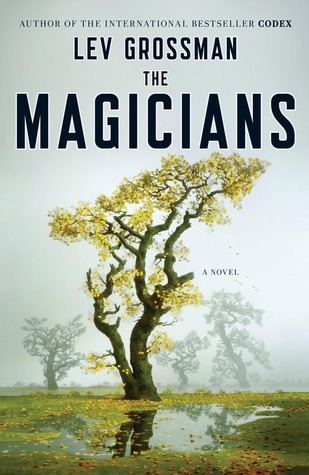 The first thing to say about The Magicians is that you shouldn't judge it by its cover. The cover is just a picture of a tree and I don't think it even supposed to be one of the magic trees very briefly described in the book. This book has nothing to do with trees... but it does have a lot to do with magicians. The book follows Quentin a young man that finds out magic is real when he is recruited to go to a school for magic (think Hogwarts for college students). The first half of the book follows his years as a student. After graduating and having a bit of an existential crisis on what is is to be a real magician, Quentin discovers that the magic land of Fillory is a real place and not just a something that exists in novels (think Narnia). So basically it is part Harry Potter and part Chronicles of Narnia (except that it is very American).
The first thing to say about The Magicians is that you shouldn't judge it by its cover. The cover is just a picture of a tree and I don't think it even supposed to be one of the magic trees very briefly described in the book. This book has nothing to do with trees... but it does have a lot to do with magicians. The book follows Quentin a young man that finds out magic is real when he is recruited to go to a school for magic (think Hogwarts for college students). The first half of the book follows his years as a student. After graduating and having a bit of an existential crisis on what is is to be a real magician, Quentin discovers that the magic land of Fillory is a real place and not just a something that exists in novels (think Narnia). So basically it is part Harry Potter and part Chronicles of Narnia (except that it is very American).So while it may not sound like the most original thing, it is actually very entertaining (especially with all the allusions to the Narnia series). Quentin and his friends are all well rounded characters and I really cared about what happened to them at the end of the book. The school portion of the book is a bit episodic but there are some important story points that pay off by the end of the novel. And of course the ending leaves the reader wanting to read the next book in the series, The Magician King. I'll give it an A-.
Also it mentions Wuthering Heights, Harry Potter, Frankenstein, and Alice in Wonderland.
Thursday, July 17, 2014
Mystery Book # 19 - The Witness for the Prosecution and Other Stories by Agatha Christie
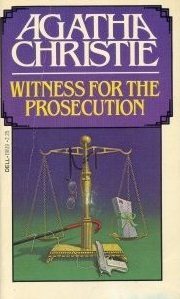 After reading And Then There Were None, I wanted to read some more Agatha Christie and then I just happened upon The Witness for the Prosecution and Other Stories in the quarter bin at a library used book sale. I was curious to see how her short stories would compare to her novels. The first story, The Witness for the Prosecution was really good and had a nice twist ending that was memorable. Now I'll have to re-watch the movie to compare it... But then after that the other stories weren't quite as good. I enjoyed them all but they didn't really stand out as anything special. Maybe I expected a bit more cleverness out of them. As a whole, I give the collection a B+.
After reading And Then There Were None, I wanted to read some more Agatha Christie and then I just happened upon The Witness for the Prosecution and Other Stories in the quarter bin at a library used book sale. I was curious to see how her short stories would compare to her novels. The first story, The Witness for the Prosecution was really good and had a nice twist ending that was memorable. Now I'll have to re-watch the movie to compare it... But then after that the other stories weren't quite as good. I enjoyed them all but they didn't really stand out as anything special. Maybe I expected a bit more cleverness out of them. As a whole, I give the collection a B+.
Thursday, July 10, 2014
Horror Book # 47 - The Hellbound Heart by Clive Barker
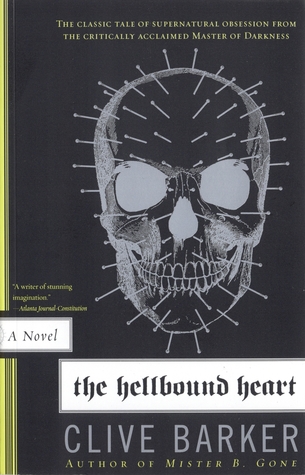 Clive Barker is another author that I somehow never got around to reading before. The Hellbound Heart basically tells the story of this guy Frank who thinks that by opening a mystical puzzle box he'll find ultimate pleasure for himself. However when he opens it he unleashes the Cenobites, who are weird beings that find pleasure in torturing Frank. Somehow Frank's spirit remains in the room where the box was opened... and later when blood is spilled in the room he slowly begins to reform his body. So he gets his sister-in-law to bring unsuspecting men back to the room to be murdered so that he can become whole again. Overall it was a good creepy story and was the basis for the first Hellraiser movie which is fairly faithful. The whole thing with weird mystical beings and objects reminded me of a Lovecraft story (but with way more gore), so extra points there. I'll give it an A-.
Clive Barker is another author that I somehow never got around to reading before. The Hellbound Heart basically tells the story of this guy Frank who thinks that by opening a mystical puzzle box he'll find ultimate pleasure for himself. However when he opens it he unleashes the Cenobites, who are weird beings that find pleasure in torturing Frank. Somehow Frank's spirit remains in the room where the box was opened... and later when blood is spilled in the room he slowly begins to reform his body. So he gets his sister-in-law to bring unsuspecting men back to the room to be murdered so that he can become whole again. Overall it was a good creepy story and was the basis for the first Hellraiser movie which is fairly faithful. The whole thing with weird mystical beings and objects reminded me of a Lovecraft story (but with way more gore), so extra points there. I'll give it an A-.
Thursday, July 3, 2014
Book # 62 The Amber Spyglass (His Dark Materials Book 3 of 3) by Phillip Pullman
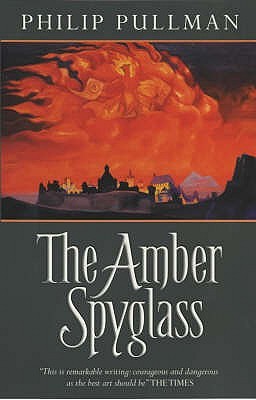 The first time I read The Amber Spyglass I felt that it was too long, had too many plot holes and was an unsatisfying end to the series. On my second reading I thought this even more so. At the end of the previous book Lyra gets kidnapped while Lord Asriel continues to build his army to fight God. The story picks up right from there and introduces even more unnecessary subplots.
The first time I read The Amber Spyglass I felt that it was too long, had too many plot holes and was an unsatisfying end to the series. On my second reading I thought this even more so. At the end of the previous book Lyra gets kidnapped while Lord Asriel continues to build his army to fight God. The story picks up right from there and introduces even more unnecessary subplots. First off, the whole subplot about a scientist, Dr. Malone, that finds herself in a realm with intelligent creatures that use nuts as wheels goes on forever and is not important and kinda boring. Next, the book never explains how Asriel builds his giant fortress and forms a coalition of beings from different realms so quickly. He goes from not even knowing that these other places even exist to having a fortress and army in just weeks. The book never explains how he even gets between these different realms. Plus I'm not sure if he is supposed to be the good guy or the bad guy. His whole quest to defeat The Authority is never explained sufficiently. How does he even know about the existence and history of the Authority? It makes no sense. Plus after building up talk of this army for two books his story ends with him wrestling the Authority's Regent... Plus Pullman keeps introducing new ideas that don't go anywhere or add much to the story at all. He builds up a plot about an assassin that just fizzles out and some kind of magic bomb that is easily defeated. Plus after so carefully mapping out the geography of action in The Golden Compass, here he just doesn't pay attention to the geography and how the realms overlap in a way that is consistent. Plus for a book that is so anti-religious and the God of the book doesn't really have any power it never explains what it is that powers the aleithometer or exactly where Dust comes from. The only part I liked was when Lyra had to abandon her daemon Pan to enter the land of the dead. I'm glad I'm done with this one, The Amber Spyglass gets a C.
Monday, June 30, 2014
Should you read the book or see the movie? Part 4
Now for my semi-annual book/movie comparisons:
A Passage to India (1924) by E. M. Forster vs. A Passage to India (1984 film version): Maybe because I saw the film first, but I think I actually prefer the film over the book. I liked the book but the film is just beautiful and doesn't really remove much from the book, plus watching the film takes far less time than reading the book. Verdict: See the movie.
The Golden Compass (1995) by Philip Pulman vs. The Golden Compass (2007 film) : The movie is okay but completely cuts out an important part at the end of the book. Verdict : Read the book.
Wuthering Heights (1847) by Emily Bronte vs. Wuthering Heights (1939 film) and (2011 film) : This wasn't my favorite book but neither of these film versions quite gets it right. The 1939 film is considered a classic but changes a lot from the book and races through only a portion of the novel. The 2011 version is just horrible. It may be one of the most artsy-fartsy movies I've ever seen. There are countless shots of flowers and animals that go in and out of focus and if you aren't familiar with the story it won't make much sense. Verdict : Read the book.
Great Expectations (1861) by Charles Dickens vs. Great Expectations (1998 film) : The 1998 version tries to update the story by setting it in modern New York and for some reason changing Pip's name to Finn. It is kind of interesting but not close to being as good as the book. Verdict : Read the book.
The Silence of the Lambs (1988) by Thomas Harris vs The Silence of the Lambs (1991 film) : Well the movie is a classic (mostly due to the performances for Anthony Hopkins and Jodie Foster) and the book itself is a fun and fast read with more depth than the book. Verdict : Read the book and see the movie.
And Then There Were None (1939) by Agatha Christie vs. And Then There Were None (1945 film version) : The book was really good and the film was fairly faithful until the last scene which completely alters the mystery and not for the better. Verdict: Read the book.
The Haunting of Hill House (1959) by Shirley Jackson vs. The Haunting (1963 film version): I enjoyed the novel and the film tries its best to remain faithful to the plot and tone of the novel. Both have their qualities. Verdict: Read the book and see the movie.
A Passage to India (1924) by E. M. Forster vs. A Passage to India (1984 film version): Maybe because I saw the film first, but I think I actually prefer the film over the book. I liked the book but the film is just beautiful and doesn't really remove much from the book, plus watching the film takes far less time than reading the book. Verdict: See the movie.
The Golden Compass (1995) by Philip Pulman vs. The Golden Compass (2007 film) : The movie is okay but completely cuts out an important part at the end of the book. Verdict : Read the book.
Wuthering Heights (1847) by Emily Bronte vs. Wuthering Heights (1939 film) and (2011 film) : This wasn't my favorite book but neither of these film versions quite gets it right. The 1939 film is considered a classic but changes a lot from the book and races through only a portion of the novel. The 2011 version is just horrible. It may be one of the most artsy-fartsy movies I've ever seen. There are countless shots of flowers and animals that go in and out of focus and if you aren't familiar with the story it won't make much sense. Verdict : Read the book.
Great Expectations (1861) by Charles Dickens vs. Great Expectations (1998 film) : The 1998 version tries to update the story by setting it in modern New York and for some reason changing Pip's name to Finn. It is kind of interesting but not close to being as good as the book. Verdict : Read the book.
The Silence of the Lambs (1988) by Thomas Harris vs The Silence of the Lambs (1991 film) : Well the movie is a classic (mostly due to the performances for Anthony Hopkins and Jodie Foster) and the book itself is a fun and fast read with more depth than the book. Verdict : Read the book and see the movie.
And Then There Were None (1939) by Agatha Christie vs. And Then There Were None (1945 film version) : The book was really good and the film was fairly faithful until the last scene which completely alters the mystery and not for the better. Verdict: Read the book.
The Haunting of Hill House (1959) by Shirley Jackson vs. The Haunting (1963 film version): I enjoyed the novel and the film tries its best to remain faithful to the plot and tone of the novel. Both have their qualities. Verdict: Read the book and see the movie.
Thursday, June 26, 2014
Doctor Sleep by Stephen King
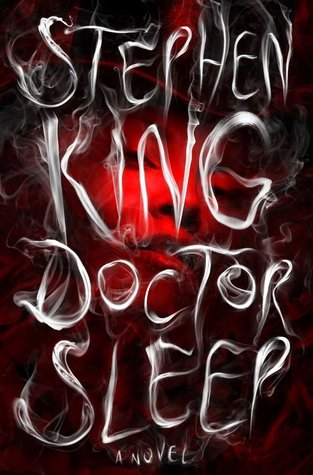 A sequel to The Shining is something that I would have to read. So when Stephen King announced that he was writing one I was excited to hear that. Doctor Sleep follows up on the life of Danny Torrance, the little boy from The Shining. He's all grown up now... we find him as an alcoholic who is still trying to cope with his gift of shining. And then there's a little girl, Abra, with an even more powerful gift that needs Danny's help when she finds out that a roving gang of "vampires" that feed on children with the shining are trying to track her down.
A sequel to The Shining is something that I would have to read. So when Stephen King announced that he was writing one I was excited to hear that. Doctor Sleep follows up on the life of Danny Torrance, the little boy from The Shining. He's all grown up now... we find him as an alcoholic who is still trying to cope with his gift of shining. And then there's a little girl, Abra, with an even more powerful gift that needs Danny's help when she finds out that a roving gang of "vampires" that feed on children with the shining are trying to track her down. Not surprisingly, Doctor Sleep isn't as good as The Shining. Actually it isn't even that scary and there are only a handful of moments when Abra is in any real danger. And while the bad guys are creepy and evil they don't compare to the ghosts from the Overlook Hotel from the original.
I enjoyed reading it but ultimately it is fairly forgettable. C+
Thursday, June 19, 2014
Mystery Book # 10 And Then There Were None by Agatha Christie
 Even though Lucinda has an entire shelf of Agatha Christie novels, somehow I had never read one before. So I figured the best place to start was with one of her most famous novels... And Then There Were None.
Even though Lucinda has an entire shelf of Agatha Christie novels, somehow I had never read one before. So I figured the best place to start was with one of her most famous novels... And Then There Were None. The premise is pretty simple. Ten total strangers are invited to stay over at a mansion on an island and none of them are quite sure why they are there. Then one of the guests is murdered. And then another guest. And so on. Until ***SPOILER*** they all wind up dead. And yes the killer is one of the ten guests. It isn't until the very end when we're presented a posthumous letter by the killer that all the pieces fit into place and it all makes perfect sense.
I greatly enjoyed the story. It was fast paced and very intriguing (especially once it becomes clear one of the guests is the murderer). The plan is clever and makes the reveal quite rewarding. I'll give it an A.
Thursday, June 12, 2014
Horror Book # 30 The Haunting of Hill House by Shirley Jackson
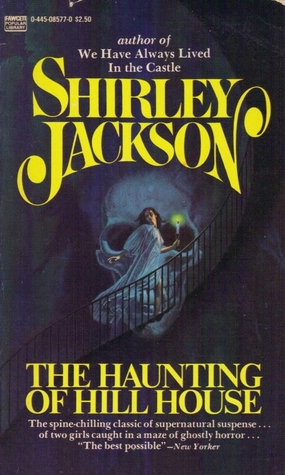 A couple of months ago I picked up The Haunting of Hill House by Shirley Jackson at the L.A. Times Festival of books and I finally got around to reading it (by comparison Lucinda bought three books at the festival and read them all within a week of purchase).
A couple of months ago I picked up The Haunting of Hill House by Shirley Jackson at the L.A. Times Festival of books and I finally got around to reading it (by comparison Lucinda bought three books at the festival and read them all within a week of purchase). The story is simple... a scientist wants to study a haunted house in a scientific manner and invites along a few people that have had paranormal experiences in the past. And of course the house is haunted and a bunch of scary stuff happens. Most of the focus of the story is on one of the other participants, Eleanor, and how the haunting plays to her fears and at the same times becomes very important to her.
The book was a fun read and now I'll have to watch the movie version. My only real complaint is (like in every haunted house story) that I don't understand why everyone stayed in the house for so long. It is totally haunted and random scary things kept happening... I would have left after what happened the first night, but the characters are determined to stay and see what other things the house will do to them.... I'll give it an A.
Thursday, June 5, 2014
Book # 75 Absalom, Absalom! by William Faulkner
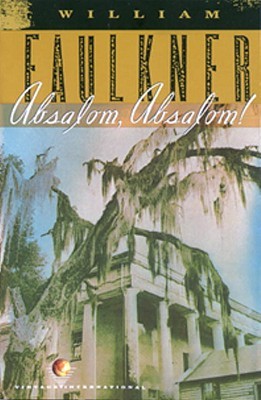 Last year I enjoyed Faulkner's The Sound and The Fury even though it was a pretty difficult book to get through. That should have prepared me for Absalom, Absalom! but it didn't. I think this one is actually a bit tougher to really understand.
Last year I enjoyed Faulkner's The Sound and The Fury even though it was a pretty difficult book to get through. That should have prepared me for Absalom, Absalom! but it didn't. I think this one is actually a bit tougher to really understand. The story is mostly about Thomas Sutpen and how he built a plantation in the South (of course with slave labor) during the 1800's and how it all eventually fell apart. Since Sutpen is such an unlikeable character I never felt bad for him, but the story of his children is pretty tragic. The story is told through narrations from multiple characters, some of whom are just speculating on what happened to the Sutpen family... so it is debatable on what "actually" happens to the characters.
The story was interesting and the writing in some parts is beautiful, but overall Faulkner's style got to be a bit much for me and kept distracting me from what was going on. I had to refer to the outline of events at the back of the book several times to make total sense of the story. I'll be giving Absalom, Absalom! a B.
Thursday, May 29, 2014
Horror Book # 9 - The Dunwich Horror and Others by H. P. Lovecraft
After reading The Dunwich Horror and Others, the first thing I have to say is that I should have been reading H.P. Lovecraft a long time ago. I'd always seen mentions of Lovecraft as being influential to horror/sci-fi writers and I should have checked him out earlier. I had bought a giant edition of all of his works shortly before we started this reading project and I only read a couple of his Poe inspired earlier works that didn't seem anything special and figured that someday I'd get around to reading some more... So since there are a couple of Lovecraft short story collections on the Horror list, I decided to read the stories that make up on of the more popular collections to really get a sense of what Lovecraft was about. And I was totally absorbed for a few days while I read these stories.
The first few stories were good (In the Vault, Pickman's Model) but then as I got to some of his longer more famous stories I was totally blown away. These include : The Rats in the Walls - about a man restoring the haunted home of his ancestors - was totally scary. The Colour Out of Space - about a meteorite that slowly poisons a farmer's land - was terrific and even scarier. The Whisperer in Darkness - about weird alien beings that terrorize a man in his farm.- had a terrific ending. The Thing on the Doorstep - in which a man's wife uses magic to slowly switch bodies with him for evil purposes- had a great twist ending. The Shadow Over Innsmouth - where a man visits a town taken over by a cult that worships alien beings - was very suspenseful. And then there are probably his two most famous stories - The Dunwich Horror and The Call of Cthulu - both of which are famous for good reason.
The Dunwich Horror fits quite a bit of story into just 50 pages or so and is kind of hard to sum up; but it has magic, weird alien beings and a scary half man half monster. The Call of Cthulu is about someone piecing together a couple of different stories to discover the existence of the monster Cthulu.
I greatly enjoyed all of these stories. I liked how Lovecraft could fit a novel's worth of story into just 20-60 quick moving pages. There is also some interconnection between the stories which ties everything together into the same "universe" and allows a greater picture of Lovecraft's world to emerge slowly bit by bit. Highly recommended for people wanting some scary weird stories. A+
Thursday, May 22, 2014
Book # 112 Lucky Jim by Kingsley Amis
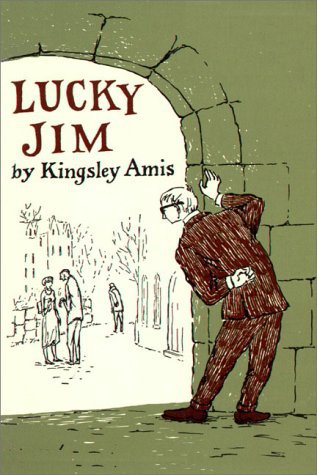 While in New York we visited the gift shop at the New York Public Library and I used that occasion as an excuse to buy a new book. I picked out Lucky Jim by Kingsley Amis because it was on the extended 101-200 portion of the list. I had no idea what it was about.
While in New York we visited the gift shop at the New York Public Library and I used that occasion as an excuse to buy a new book. I picked out Lucky Jim by Kingsley Amis because it was on the extended 101-200 portion of the list. I had no idea what it was about. Lucky Jim is about a young medieval history professor at an English college that is nearing the end of his first year on the job. He's worried that he's going to be fired at the end of the year because he is always making bad impressions with everyone important on campus. It doesn't help that he is a bit of a lazy drunkard that likes to play childish jokes on people. The novel follows him around while he has to try and make a final good impression on an important professor... and during this time he meets the professor's son (whom he hates) and the son's girlfriend (whom he finds perfect in every way). There is also another professor that he sort of liked, but she is recovering from a failed suicide attempt. He is also asked to give a presentation that could have a large impact on whether or not he gets fired.
The novel is very funny and even though Jim has many faults and does some mean stuff, I was always rooting for him. The situations he gets himself in are very comical and all of the characters are well written and unique. I found the scene when he must take the bus to the train station to meet a girl before her train leaves laugh out loud funny. Here's a sample :
"Just then the bus rounded a corner and slowed abruptly, then stopped. Making a lot of noise a farm tractor was laboriously pulling, at right angles across the road, something that looked like the springs of a giant's bed... Dixon thought that he really would have to run downstairs and knife the drivers of both vehicles; what next? what next? What actually would be next: a masked hold-up, a smash, floods, a burst tyre, an electric storm with falling trees and meteorites, a diversion, a low-level attack by Communist aircraft, sheep, the driver stung by hornets? He'd choose the last of these if consulted."
I'll give it an A.
Wednesday, May 14, 2014
Book # 62 The Subtle Knife (His Dark Materials Book 2 of 3) by Philip Pullman
 The Subtle Knife continues the story that began in The Golden Compass and really starts to show what the overall story is actually about. Whereas the first book took place in a world similar but different from our own ,The Subtle Knife takes place in several worlds that all occupy the same physical space. In our own world we are introduced to Will, a boy that is on the run and in many ways is just a male counterpart to Lyra. He finds himself in one of these other realms where he meets Lyra and they team up to try and find Will's father. Their adventures lead Will to obtain 'the subtle knife' which allows the bearer to cut a hole between worlds. They also learn Lord Asriel's plan is to try and take down God or at least a being pretending to be God. And a bunch of other stuff happens.
The Subtle Knife continues the story that began in The Golden Compass and really starts to show what the overall story is actually about. Whereas the first book took place in a world similar but different from our own ,The Subtle Knife takes place in several worlds that all occupy the same physical space. In our own world we are introduced to Will, a boy that is on the run and in many ways is just a male counterpart to Lyra. He finds himself in one of these other realms where he meets Lyra and they team up to try and find Will's father. Their adventures lead Will to obtain 'the subtle knife' which allows the bearer to cut a hole between worlds. They also learn Lord Asriel's plan is to try and take down God or at least a being pretending to be God. And a bunch of other stuff happens.I feel like I enjoyed this book more the first time I read it, maybe because I know where it is all heading. Plus I wanted to know more about the computer program that one of the characters created that acts the same way as the alethiometer. How it was created raises a lot of questions and I want answers! And I thought it was weird how in the first book none of the characters can travel between worlds but all of a sudden Mrs. Coulter now has ways of travelling to our realm and back. Still I liked the book and give it an A-.
Thursday, May 8, 2014
Book # 200 - The New York Trilogy by Paul Auster
The original point of this blog was to read the top 100 books that appeared on http://thegreatestnovels.com/top100.htm. And while that is still my goal, I slowly added other reading lists to the project to add some variety to my reading... so now I need to point out that the website that provided the initial 100 list actually has a second list with the 101-200 "greatest novels". Now I'm not going to say that I'm going to read all of the second hundred but I will be reading some of them from time to time.
 So, I just back from a vacation to New York and I was trying to find something New York related to read while traveling and The New York Trilogy by Paul Auster sounded like the perfect thing. The New York Trilogy consists of three mostly unrelated sort of detective mystery stories. The first story, City of Glass, is about a writer that receives a phone call intended for someone else and ends up becoming involved in a weird mystery. Next is Ghosts, in which a man is hired to follow another man and tries to figure out why he is tailing this other man. And last is The Locked Room in which a man finds out that an old friend has disappeared and has left him a stack of great unpublished novels.
So, I just back from a vacation to New York and I was trying to find something New York related to read while traveling and The New York Trilogy by Paul Auster sounded like the perfect thing. The New York Trilogy consists of three mostly unrelated sort of detective mystery stories. The first story, City of Glass, is about a writer that receives a phone call intended for someone else and ends up becoming involved in a weird mystery. Next is Ghosts, in which a man is hired to follow another man and tries to figure out why he is tailing this other man. And last is The Locked Room in which a man finds out that an old friend has disappeared and has left him a stack of great unpublished novels.
I enjoyed all three stories quite a bit. Each one starts out like a typical detective story but slowly they become stranger and stranger until the main character has a mental breakdown and begins to question their own identity. The interior cover pages label each story as "A Penguin Existential Mystery" which does seem very accurate. All three stories share similar themes and aren't really about solving the mysteries they present but rather asking questions about identity, obsession and the connection between the person solving a mystery and the person who created it.
I'd recommend the book if you like mysteries and don't mind if they don't get solved in the end in a traditional way. An A.
Oh yeah... the novel name checks Moby Dick a few times and includes a whole discussion about Don Quixote and the framing device used within it that questions who the "actual" author is supposed to be and how the answer to that informs the reader on possible motives of the characters within Don Quixote. That whole sequence left be glad that I'd already read Don Quixote.
 So, I just back from a vacation to New York and I was trying to find something New York related to read while traveling and The New York Trilogy by Paul Auster sounded like the perfect thing. The New York Trilogy consists of three mostly unrelated sort of detective mystery stories. The first story, City of Glass, is about a writer that receives a phone call intended for someone else and ends up becoming involved in a weird mystery. Next is Ghosts, in which a man is hired to follow another man and tries to figure out why he is tailing this other man. And last is The Locked Room in which a man finds out that an old friend has disappeared and has left him a stack of great unpublished novels.
So, I just back from a vacation to New York and I was trying to find something New York related to read while traveling and The New York Trilogy by Paul Auster sounded like the perfect thing. The New York Trilogy consists of three mostly unrelated sort of detective mystery stories. The first story, City of Glass, is about a writer that receives a phone call intended for someone else and ends up becoming involved in a weird mystery. Next is Ghosts, in which a man is hired to follow another man and tries to figure out why he is tailing this other man. And last is The Locked Room in which a man finds out that an old friend has disappeared and has left him a stack of great unpublished novels.I enjoyed all three stories quite a bit. Each one starts out like a typical detective story but slowly they become stranger and stranger until the main character has a mental breakdown and begins to question their own identity. The interior cover pages label each story as "A Penguin Existential Mystery" which does seem very accurate. All three stories share similar themes and aren't really about solving the mysteries they present but rather asking questions about identity, obsession and the connection between the person solving a mystery and the person who created it.
I'd recommend the book if you like mysteries and don't mind if they don't get solved in the end in a traditional way. An A.
Oh yeah... the novel name checks Moby Dick a few times and includes a whole discussion about Don Quixote and the framing device used within it that questions who the "actual" author is supposed to be and how the answer to that informs the reader on possible motives of the characters within Don Quixote. That whole sequence left be glad that I'd already read Don Quixote.
Sunday, April 27, 2014
Morrissey - Autobiography
One of my favorite highly specific sub-genre categories is British rock star autobiographies. Last year I read Pete Townshend's and the year before Keith Richards'... so now I've tackled Morrissey's retelling of his life story.
Like most British rock star autobiographies, we start in a poor working class British town (in this case Manchester) and learn about the parents and how difficult they had it. Right away Morrissey shows that he has real skill in writing about his hometown and gives us a good bit of vivid imagery such as "... we live in forgotten Victorian knife-plunging Manchester, where everything lies wherever it was left over one hundred years ago. The safe streets are dimly lit, the others not lit at all, but both represent a danger that you're asking for should you find yourself out there once curtains have closed for tea." But after a few pages of this Morrissey starts cataloging all of his favorite childhood movies, tv shows, songs, etc. It starts out interesting but after awhile it just becomes too much information about pop culture that I've never heard of before. Then he goes on and on about how badly he was treated in school (mostly by teachers) and how he only found comfort in the band The New York Dolls and whatever bands came through Manchester. It seems that once Morrissey is a fan of something he is quite passionate about it and once he gains fame he tries to bring these artists new fans (such as his quest to reform the New York Dolls and making sure Jobriath finally gets a CD release).
 Finally after 150 pages or so, he finally meets Johnny Marr and the Smiths are quickly formed. At this point he just complains about how horrible the management of the Rough Trade label was and how they took advantage of him, Still he seems unhappy about everything even though they sell out most of their US concert tour. Then all too quickly the Smiths break up and it is never really clear why this happens, maybe Morrissey himself doesn't really know, it would be interesting to hear Marr's version of events on this.Morrissey then starts out on a pretty good solo career and finds himself selling out huge concert venues yet he still feels alone, grumpy and upset at his label and the British print media.
Finally after 150 pages or so, he finally meets Johnny Marr and the Smiths are quickly formed. At this point he just complains about how horrible the management of the Rough Trade label was and how they took advantage of him, Still he seems unhappy about everything even though they sell out most of their US concert tour. Then all too quickly the Smiths break up and it is never really clear why this happens, maybe Morrissey himself doesn't really know, it would be interesting to hear Marr's version of events on this.Morrissey then starts out on a pretty good solo career and finds himself selling out huge concert venues yet he still feels alone, grumpy and upset at his label and the British print media.
Then he tells the story of why the Smiths will never ever reform... when Mike Joyce (the drummer) sued Morrissey and Marr for a higher percentage of Smiths royalties. He goes on and on about this for about fifty pages and it still seems like a very sore spot for him. After this he moves to Los Angeles and seems relatively happy (for him) and continues with his successful solo career... though he seems oddly obsessed with where his singles land on the music charts as is always disappointed when they don't chart higher.
It was an interesting read and Morrissey does reveal that he is at heart a fan of music/movies/poetry and that he feels the need to refute everything that isn't true that is said about him in the press. Also, he seems really sensitive and does get his feelings hurt my small comments that he still remembers after all of these years. Plus he does seem to have a good bit of self doubt even after he gains a huge following. The book reveals a lot about his character (but nothing that isn't really surprising if you are familiar with his music) but still leaves a lot out about his personal life... as if he still wants to remain a bit of a mystery and preserve the "character" of the miserable lonely rock star that he has cultivated. I'm sure most fans aren't that interested in reading pages and pages of how teachers were mean to him growing up or how stupid the judge in the lawsuit against him was... but would like to know more about his relationships and if he's actually ever been in love or not. And we don't really find that out here. I'll give it a B+.
Like most British rock star autobiographies, we start in a poor working class British town (in this case Manchester) and learn about the parents and how difficult they had it. Right away Morrissey shows that he has real skill in writing about his hometown and gives us a good bit of vivid imagery such as "... we live in forgotten Victorian knife-plunging Manchester, where everything lies wherever it was left over one hundred years ago. The safe streets are dimly lit, the others not lit at all, but both represent a danger that you're asking for should you find yourself out there once curtains have closed for tea." But after a few pages of this Morrissey starts cataloging all of his favorite childhood movies, tv shows, songs, etc. It starts out interesting but after awhile it just becomes too much information about pop culture that I've never heard of before. Then he goes on and on about how badly he was treated in school (mostly by teachers) and how he only found comfort in the band The New York Dolls and whatever bands came through Manchester. It seems that once Morrissey is a fan of something he is quite passionate about it and once he gains fame he tries to bring these artists new fans (such as his quest to reform the New York Dolls and making sure Jobriath finally gets a CD release).
 Finally after 150 pages or so, he finally meets Johnny Marr and the Smiths are quickly formed. At this point he just complains about how horrible the management of the Rough Trade label was and how they took advantage of him, Still he seems unhappy about everything even though they sell out most of their US concert tour. Then all too quickly the Smiths break up and it is never really clear why this happens, maybe Morrissey himself doesn't really know, it would be interesting to hear Marr's version of events on this.Morrissey then starts out on a pretty good solo career and finds himself selling out huge concert venues yet he still feels alone, grumpy and upset at his label and the British print media.
Finally after 150 pages or so, he finally meets Johnny Marr and the Smiths are quickly formed. At this point he just complains about how horrible the management of the Rough Trade label was and how they took advantage of him, Still he seems unhappy about everything even though they sell out most of their US concert tour. Then all too quickly the Smiths break up and it is never really clear why this happens, maybe Morrissey himself doesn't really know, it would be interesting to hear Marr's version of events on this.Morrissey then starts out on a pretty good solo career and finds himself selling out huge concert venues yet he still feels alone, grumpy and upset at his label and the British print media.Then he tells the story of why the Smiths will never ever reform... when Mike Joyce (the drummer) sued Morrissey and Marr for a higher percentage of Smiths royalties. He goes on and on about this for about fifty pages and it still seems like a very sore spot for him. After this he moves to Los Angeles and seems relatively happy (for him) and continues with his successful solo career... though he seems oddly obsessed with where his singles land on the music charts as is always disappointed when they don't chart higher.
It was an interesting read and Morrissey does reveal that he is at heart a fan of music/movies/poetry and that he feels the need to refute everything that isn't true that is said about him in the press. Also, he seems really sensitive and does get his feelings hurt my small comments that he still remembers after all of these years. Plus he does seem to have a good bit of self doubt even after he gains a huge following. The book reveals a lot about his character (but nothing that isn't really surprising if you are familiar with his music) but still leaves a lot out about his personal life... as if he still wants to remain a bit of a mystery and preserve the "character" of the miserable lonely rock star that he has cultivated. I'm sure most fans aren't that interested in reading pages and pages of how teachers were mean to him growing up or how stupid the judge in the lawsuit against him was... but would like to know more about his relationships and if he's actually ever been in love or not. And we don't really find that out here. I'll give it a B+.
Monday, March 24, 2014
Book # 41 A Passage to India by E. M. Forster
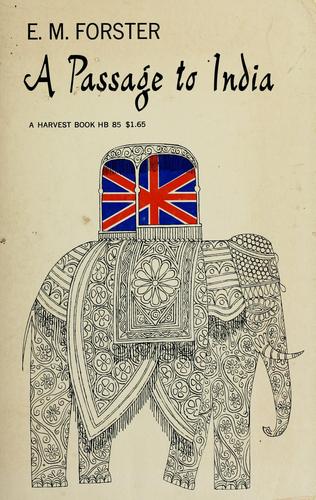 Lucinda and I occasionally discuss whether or not it is better to see the movie version of something before or after reading the book. She seems to always prefer seeing the film first. I however am the opposite. My thinking is that reading the book is more time consuming than watching a film version (except for maybe The Hobbit), so I want to keep the excitement of having the plot unfold for the reading experience. Also, seeing a film version first makes you imagine certain actors while reading the book and takes away some of the imagination one uses while reading. So, I bring all this up because a month before reading A Passage to India we watched the David Lean film version. And I really enjoyed the movie because I really knew nothing at all about the story.
Lucinda and I occasionally discuss whether or not it is better to see the movie version of something before or after reading the book. She seems to always prefer seeing the film first. I however am the opposite. My thinking is that reading the book is more time consuming than watching a film version (except for maybe The Hobbit), so I want to keep the excitement of having the plot unfold for the reading experience. Also, seeing a film version first makes you imagine certain actors while reading the book and takes away some of the imagination one uses while reading. So, I bring all this up because a month before reading A Passage to India we watched the David Lean film version. And I really enjoyed the movie because I really knew nothing at all about the story.The story is set in British ruled India where Miss Quested is visiting Ronny Heaslop to determine if she should marry him. While there Miss Quested, Ronny's mother Mrs. Moore and a British headmaster Mr. Fielding befriend an Indian doctor named Aziz. He invites them to visit some caves and *SPOILER* while alone in a cave Miss Quested mistakenly believes that Aziz tried to assault her. Then there's a big trial and everyone gets upset and stuff happens.
So having just seen the movie I couldn't help but imagine the actors while reading the book and knew exactly what was coming in the plot (and the film is fairly faithful to the book except for maybe placing a bit more emphasis on Miss Quested by showing her actually travelling to India and a pretty quick resolution to the misunderstanding between Aziz and Mr. Fielding that ends the story). All that being said I still enjoyed the book and liked the way Forster writes. The only drawbacks to me were that I wasn't familiar with all the Indian terms used throughout the book (and I'll admit laziness to not looking them up) and Forster would frequently make sweeping stereotypical statements about the differences between Indians and the British such as "Suspicion in the Oriental is a sort of malignant tumour, a mental malady, that makes him self-conscious and unfriendly suddenly; he trusts and mistrusts at the same time in a way the Westerner cannot comprehend."
I'd recommend the book and give it an A-. I'm curious though if my opinion would be any different if I hadn't seen the film first.
Friday, March 7, 2014
Mystery Book # 16 and Horror Book # 26 - The Silence of the Lambs by Thomas Harris
 While I was reading The Silence of the Lambs I realized that I really don't remember all that much from the movie. I'll have to watch it again to see how close it is to the book. But what I remembered as the basic story outline from the movie is the same as in the book: FBI agent in training, Clarice Starling, tries to get information out of captured serial killer Hannibal Lecter that could help in the search for another serial killer, Buffalo Bill.
While I was reading The Silence of the Lambs I realized that I really don't remember all that much from the movie. I'll have to watch it again to see how close it is to the book. But what I remembered as the basic story outline from the movie is the same as in the book: FBI agent in training, Clarice Starling, tries to get information out of captured serial killer Hannibal Lecter that could help in the search for another serial killer, Buffalo Bill. Just like the book that precedes it, Red Dragon, I really enjoyed it and felt that Harris moved the story along at a nice quick pace and gave us enough of a peek into the minds of the characters to know all of their motivations and feelings. Unlike in Red Dragon, The Silence of the Lambs gives us more time with Hannibal and not the actual serial killer that is being chased. I guess I'll eventually have to read the next book in the series even though I've heard it isn't that great.
I can see how the book ranked so high on both the Mystery and Horror lists. It is very readable and every once in a while Harris throws in a nice little poetic sentence to describe a characters feelings or past history. It is also thrilling and scary. I'll have to give it an A.
Sunday, March 2, 2014
Book # 62 The Golden Compass (His Dark Materials Book 1 of 3) by Phillip Pullman
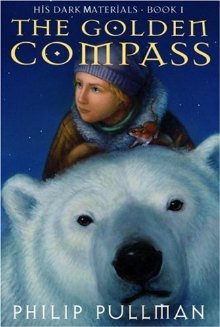 The first time I read The Golden Compass was around the time when the movie came out seven or so years ago. I ended up reading the whole series and for the most part enjoyed it even though I had some problems with the final book. Sadly the movie wasn't that great and the whole series never got filmed.
The first time I read The Golden Compass was around the time when the movie came out seven or so years ago. I ended up reading the whole series and for the most part enjoyed it even though I had some problems with the final book. Sadly the movie wasn't that great and the whole series never got filmed.The first book in the His Dark Materials series, The Golden Compass, focuses on a young girl, Lyra. She lives in a sort of alternate fantasy universe which is slightly similar to our world except that there are flying witches, talking armored bears, and everyone has a daemon which is a part of them. A daemon is a sort of spirit that is partnered with each human and takes the form of an animal. As a child a person's daemon can change shape to a variety of animals, but as that person matures the daemon takes a static animal form. Lyra is being raised at Oxford College which is run by the alternate universe's equivalent of the Catholic Church. Her "uncle" Lord Asriel is investigating a mysterious phenomenon called Dust while the church is trying to stop him. There is also Mrs. Coulter who is running experiments that involves kidnapping poor children and then trying to separate their daemons from them. So of course Lyra gets involved in both Lord Asriel's and Mrs. Coulter's plottings and also ends up becoming friends with a talking bear and a cowboy from Texas.
There is a lot of stuff going on and Pullman does a great job of building up this world and the politics of how it works. The only problem is that the first book doesn't tell a self contained story at all and, as I recall, by the third book too much stuff is going on and everything gets jumbled up. But I should wait for my report on the final book to go into that. The first book gets an A-.
Thursday, February 20, 2014
Book # 16 Wuthering Heights by Emily Bronte
 You know how sometimes there's a film or book or record that you've heard about your entire life as being such a classic and then when you finally getting around to watching,reading, or listening to it you can't tell what all the fuss was about.... and it isn't that you didn't enjoy it or see some good qualities in it, you just don't see how it is ranked as one of the best ever? Well that sums up my feelings on Wuthering Heights by Emily Bronte.
You know how sometimes there's a film or book or record that you've heard about your entire life as being such a classic and then when you finally getting around to watching,reading, or listening to it you can't tell what all the fuss was about.... and it isn't that you didn't enjoy it or see some good qualities in it, you just don't see how it is ranked as one of the best ever? Well that sums up my feelings on Wuthering Heights by Emily Bronte.The story is fairly simple, yet the structure of the story and the way that everyone has multiple names which keep changing and are shared among each other made it a bit confusing to really get into. Basically this man adopts a boy, Heathcliff, and as they grow up he and the man's daughter, Catherine, fall in love with each other. Yet she marries their neighbor Edgar which causes Heathcliff out of spite to marry Edgar's sister. And from this point on everyone acts miserable all of the time and tries to destroy each others' lives. The story continues on with the kids from each pairing, who of course fall in love with each other but are made miserable by the feud between Edgar and Heathcliff.
I enjoyed Bronte's style even if the structure made it a bit confusing. I thought by introducing the children from the end of the story first made me unnecessarily try and figure out all of the relations between all of the characters right away. Also most of the characters were pretty unlikable. Catherine is a total brat, Heathcliff is incredibly selfish and is pretty much always being mean. At first I felt bad for Edgar and also Heathcliff's son, but by the end they both bugged me too. I'm going to have to give it a B+.
Friday, February 7, 2014
Red Rising by Pierce Brown
 I saw the review for Red Rising in Entertainment Weekly a couple of weeks ago and I figured I'd give it a shot since it said it was pretty much just a mix of Ender's Game and The Hunger Games... and I did enjoy it. The story is about Darrow, a teenager working in a mine on Mars. Of course his people are oppressed by the rulers of Mars and he ends up with a shadowy group that transforms Darrow into one of the elite ruling class "Golds" in order to infiltrate the government and help take them down. But in order to get a good position in society he must first go through a year long competition in which young Golds are put into groups and forced to play a sort of Survivor/Hunger Games thing first in which a whole bunch of them die. While the book isn't a classic like Ender's Game, it is somewhat better than The Hunger Games and is a bit better written. Of course it is only the first book in a trilogy, so the ending leaves you wanting to know what happens next. B+
I saw the review for Red Rising in Entertainment Weekly a couple of weeks ago and I figured I'd give it a shot since it said it was pretty much just a mix of Ender's Game and The Hunger Games... and I did enjoy it. The story is about Darrow, a teenager working in a mine on Mars. Of course his people are oppressed by the rulers of Mars and he ends up with a shadowy group that transforms Darrow into one of the elite ruling class "Golds" in order to infiltrate the government and help take them down. But in order to get a good position in society he must first go through a year long competition in which young Golds are put into groups and forced to play a sort of Survivor/Hunger Games thing first in which a whole bunch of them die. While the book isn't a classic like Ender's Game, it is somewhat better than The Hunger Games and is a bit better written. Of course it is only the first book in a trilogy, so the ending leaves you wanting to know what happens next. B+Also, the book mentions Ulysses, The Count of Monte Cristo, Lord of the Flies, 1984 and The Great Gatsby.
Thursday, January 30, 2014
S by J.J. Abrams and Doug Dorst
And now for a book not on any of my lists... S by JJ Abrams and Doug Dorst. This book needs a bit of explanation... since it is a pretty original type of book. The name on the cover of the slipcase is S... but inside it is a book titled Ship of Theseus by V.M. Straka. Now this book is made to look like a very old copy from a library and is stuffed full of random things like postcards, articles, letters, pictures and even a napkin that continually try and fall out of the book. Also the margins are completely filled with notes between two people who are sharing the book back and forth... so really there are three different plots going on here.

First is the text of the book Ship of Theseus by the fictional author Straka. The book tells the strange story of a man with no memory that gets picked up on a weird ghost ship and travels around the world being manipulated to kill people while searching for a woman that he may or may not love or even know. Very strange, intriguing and unique...
Next are the footnotes (and introduction) to the text that seem to reveal another story about the relationship between Straka's translator and Straka himself and a mystery about who the true identity of the author really is. This part really reminded me of Pale Fire.
Third are the handwritten notes in the margins that reveal a story about two students that pass the book back and forth as they try and solve the mystery of who the author really was. They soon start thinking that someone is after them to not solve the mystery of who Straka really was and become more and more paranoid. They also leave random stuff for each other in specific parts of the book.
I have to give the book credit for being an original type of book and I don't really see how it could ever be reprinted in any different format without loosing something. And I was really into it while I was reading it... but in the end I have to give it only a B+. Mostly because the book brings up so many questions and doesn't answer quite a few of them... especially about what really happens off the pages between the two students. I shouldn't be surprised... after all J.J. Abrams did help create Lost.
Oh yeah...there's a Don Quixote reference too.
Oh yeah...there's a Don Quixote reference too.
Wednesday, January 22, 2014
Mystery Book # 1 The Complete Sherlock Holmes by Sir Arthur Conan Doyle - The Sign of Four (Book 2 of 9)
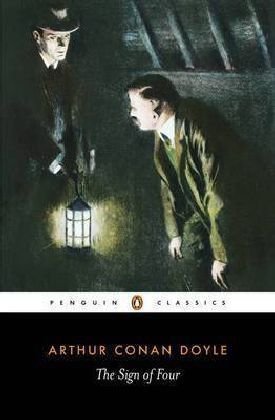 The second Sherlock Holmes novel, The Sign of Four, is almost as enjoyable as the first one. In this case Sherlock and Watson get involved in a mystery about a stolen treasure and of course a murder. I don't really have too much to say about it, but just like the first one, this book is a fun fast read and that I really enjoy Doyle's writing style. The only reason I'm giving it an A- is that it isn't quite as good as the first book (the back story of mystery isn't quite as weird as the whole Mormon kidnapping plot in A Study in Scarlet). I'll just add that it is interesting that Sherlock is shown to be a drug addict here... that's something that seems to not make it into most Sherlock Holmes movies or TV shows.
The second Sherlock Holmes novel, The Sign of Four, is almost as enjoyable as the first one. In this case Sherlock and Watson get involved in a mystery about a stolen treasure and of course a murder. I don't really have too much to say about it, but just like the first one, this book is a fun fast read and that I really enjoy Doyle's writing style. The only reason I'm giving it an A- is that it isn't quite as good as the first book (the back story of mystery isn't quite as weird as the whole Mormon kidnapping plot in A Study in Scarlet). I'll just add that it is interesting that Sherlock is shown to be a drug addict here... that's something that seems to not make it into most Sherlock Holmes movies or TV shows.Thursday, January 9, 2014
Horror Book # 14 - They Thirst by Robert R McCammon
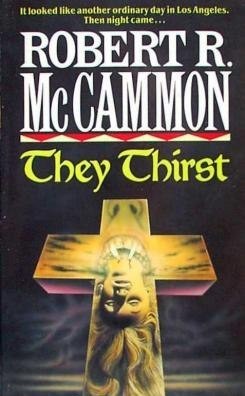 First off it I'll just say it took me quite a while to get through this book... first because I moved and had to spend all of my free time doing stuff around the house and then because I became addicted to NCAA Football for XBOX and couldn't stop playing it. Originally I thought I'd finish the book before Halloween... and now here it is a week into 2014 and I finally got through to the end. Now it may seem that this would indicate that I didn't enjoy the book, but really it is just the opposite. If I'm not enjoying a book I usually force myself to get though it as fast as I can (like when I read the final Girl with the Dragon Tattoo book in two days). Every time I picked up They Thirst during my lunch break I enjoyed reading a chapter in which vampires took over Los Angeles.
First off it I'll just say it took me quite a while to get through this book... first because I moved and had to spend all of my free time doing stuff around the house and then because I became addicted to NCAA Football for XBOX and couldn't stop playing it. Originally I thought I'd finish the book before Halloween... and now here it is a week into 2014 and I finally got through to the end. Now it may seem that this would indicate that I didn't enjoy the book, but really it is just the opposite. If I'm not enjoying a book I usually force myself to get though it as fast as I can (like when I read the final Girl with the Dragon Tattoo book in two days). Every time I picked up They Thirst during my lunch break I enjoyed reading a chapter in which vampires took over Los Angeles.The plot of They Thirst is fairly simple but also epic in scope... vampires are taking over Los Angeles (the week before Halloween) with the intent to take over the whole world. The vampires are the scary traditional type of vampire - they are burned by holy water and crucifixes, they can't go into sunlight, and they are totally vicious and bite and kill tons of people. No glittery vampires that girls will fall in love with here. There are quite a few characters (most of whom die horrible vampire related deaths) and even a whole subplot about a serial killer on the loose. And like Los Angeles, the characters are all fairly diverse... but in the end the main (human) characters are a cop, a priest, an actor, and a nerdy teenager.
As a horror book it really delivered... there are numerous scary scenes (though I guess most of them are of people being attacked by vampires) and the end really pays off and isn't disappointing at all. There are a few other books on the horror list by Robert McCammon and now I'm really looking forward to reading them. I'll have to give it an A.
Friday, January 3, 2014
Fortunately, the Milk by Neil Gaiman and illustrated by Skottie Young
 It has been awhile since I've put any new reviews and even longer since I've finished a real book. First there was the whole buying a house thing and then moving into that house, and then unpacking everything in the house and then once all that was done instead of resuming my reading I ended up buying NCAA Football 13 for XBox and am in the middle of trying to win the MAC conference championship in my third season at UMass.... So eventually I'll finish that book that I've been reading since well before Halloween. But since Christmas came and passed I used that opportunity to buy a Neil Gaiman children's book, read it quickly, and then use it as a gift to someone. I've known that some of his books venture into YA territory but I was curious how weird one of his children's books would be.
It has been awhile since I've put any new reviews and even longer since I've finished a real book. First there was the whole buying a house thing and then moving into that house, and then unpacking everything in the house and then once all that was done instead of resuming my reading I ended up buying NCAA Football 13 for XBox and am in the middle of trying to win the MAC conference championship in my third season at UMass.... So eventually I'll finish that book that I've been reading since well before Halloween. But since Christmas came and passed I used that opportunity to buy a Neil Gaiman children's book, read it quickly, and then use it as a gift to someone. I've known that some of his books venture into YA territory but I was curious how weird one of his children's books would be. So I don't really have that much to say about Fortunately, the Milk except that it is a pretty good book for kids I guess. The premise is that a dad goes out to buy milk for his kids cereal and ends up taking a really long time so he has to make up a crazy story to tell his kids about what took him so long. His story has time travel, dinosaurs, pirates, etc. I suppose I really wouldn't recommend it if you have to actually pay for it, but if someone hands it to you and you have nothing better to do it'll pass the time. I'll give it a B.
Subscribe to:
Comments (Atom)

